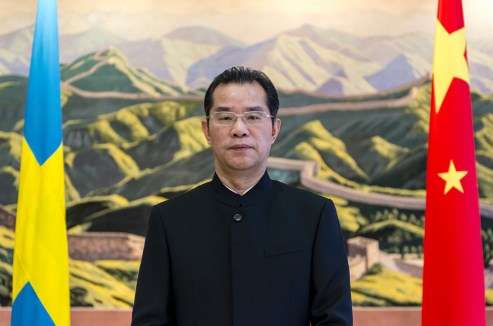Media rights watchdog Reporters Without Borders (RSF) on Monday urged China’s embassy in Stockholm to stop harassing Swedish journalists, accusing Beijing of trying to impose censorship outside its borders.
RSF intervened following the latest in a series of statements by the Chinese embassy there, this time attacking the news website of Sweden’s public broadcaster SVT.
China’s ambassador to Sweden, Gui Congyou, “has embarked on a ‘truth’ crusade against the country’s media since taking office in August 2017”, RSF said in its statement.

Since July 2018, the embassy has denounced multiple Swedish news outlets, including the country’s two main national dailies Dagens Nyheter and Svenska Dagbladet and the news agency TT.
Regional dailies Upsala Nya Tidning and Nya Wermlands-Tidningen, and public sector weekly Dagens Samhalle have also come in for criticism.
“Diplomatic missions have no say in the editorial content of media in their host country,” Erik Halkjaer, the head of RSF Sweden said.
The embassy’s latest statement criticised the SVT website for publishing an opinion piece written by a representative to the Taipei mission on February 27, calling for support for Taiwanese democracy amid threats from China.
”Read the Reporters Without Borders statement in full – click to view.“
“But why is he so harsh?” This is a question that Swedish journalists keep asking in reference to Chinese ambassador to Sweden, Gui Congyou, who has embarked on a “truth” crusade against the country’s media since taking office in August 2017. The ambassador, who developed his career between the Chinese Embassy in Russia and the Department of European-Central Asian Affairs of the Chinese Ministry of Foreign Affairs, seems to have trouble understanding that in Sweden, a country ranked second in the RSF’s 2018 World Press Freedom Index, journalists are not subject to censorship.
On the embassy’s website, the ambassador recently posted a long, unsigned attack against SVT Nyheter, a major Swedish news outlet. The diplomat castigates the site for giving a platform to David Liao, Representative to the Taipei Mission in Sweden, on February 27. Liao published an opinion piece calling support for Taiwanese democracy against Chinese threat. According to Gui Congyou, the article “challenges the one China principle” and “amounts to serious political provocation.” Beijing is very aggressive in claiming sovereignty over the island of Taiwan, despite it having an independent government since 1949.
“Diplomatic missions have no say in the editorial content of media in their host country,” says Erik Halkjaer, the president of Reporters Without Borders (RSF) Sweden. Cédric Alviani, the head of RSF East Asia bureau, considers that these attacks “reveal the unrestrained attitude with which Beijing is now trying to impose its censorship outside its borders.”
The attack on SVT Nyheter is indeed not an isolated incident. Since July of 2018, the Chinese Embassy in Stockholm has attacked multiple Swedish news sources, including Dagens Nyheter (DN), Tidningarnas Telegrambyrå (TT), 8 Sidor, Upsala Nya Tidning, Dagens Samhälle, Nya Wermlands-Tidningen, and Svenska Dagbladet (SvD).
The ambassador was particularly harsh towards Swedish journalist Jojje Olsson, author of a book on the Swedish publisher Gui Minhai, who was kidnapped in Thailand in 2015 and is still detained in China with no scheduled sentencing. Last December, he also attacked Swedish journalist and commentator Kurdo Baksi, accusing him of “instigating hatred against China.”
China is the world’s biggest jailers of journalists, with more than 60 currently detained. In the 2018 World Press Freedom Index published by RSF, the country rank stagnates at 176th out of 180.
China and Taiwan split after a civil war in 1949, but Beijing still sees the self-ruling island as part of its territory, to be brought back into the fold.
Beijing has stepped up diplomatic pressure on Taiwan since President Tsai Ing-wen took office in 2016, as she has refused to acknowledge its “one China” policy.
Cedric Alviani, the head of RSF’s East Asia bureau, said China’s attacks on Swedish media “reveal the unrestrained attitude with which Beijing is now trying to impose its censorship outside its borders”.

RSF recalled that China is the world’s biggest jailer of journalists, with more than 60 currently detained, while Sweden ranked second in the RSF’s 2018 World Press Freedom Index.
Ties between Sweden and China have been strained in recent years, following the detention of publisher Gui Minhai, a Chinese-born Swede who vanished into Chinese custody in January 2018 under murky circumstances.
China also lodged a diplomatic complaint in September 2018 accusing Swedish police of treating Chinese tourists “brutally” after a family was ejected from a Stockholm hotel.
Following that incident, a Swedish satirical current affairs programme on SVT poked fun at China, prompting Beijing to demand an apology and accusing it of racism.
